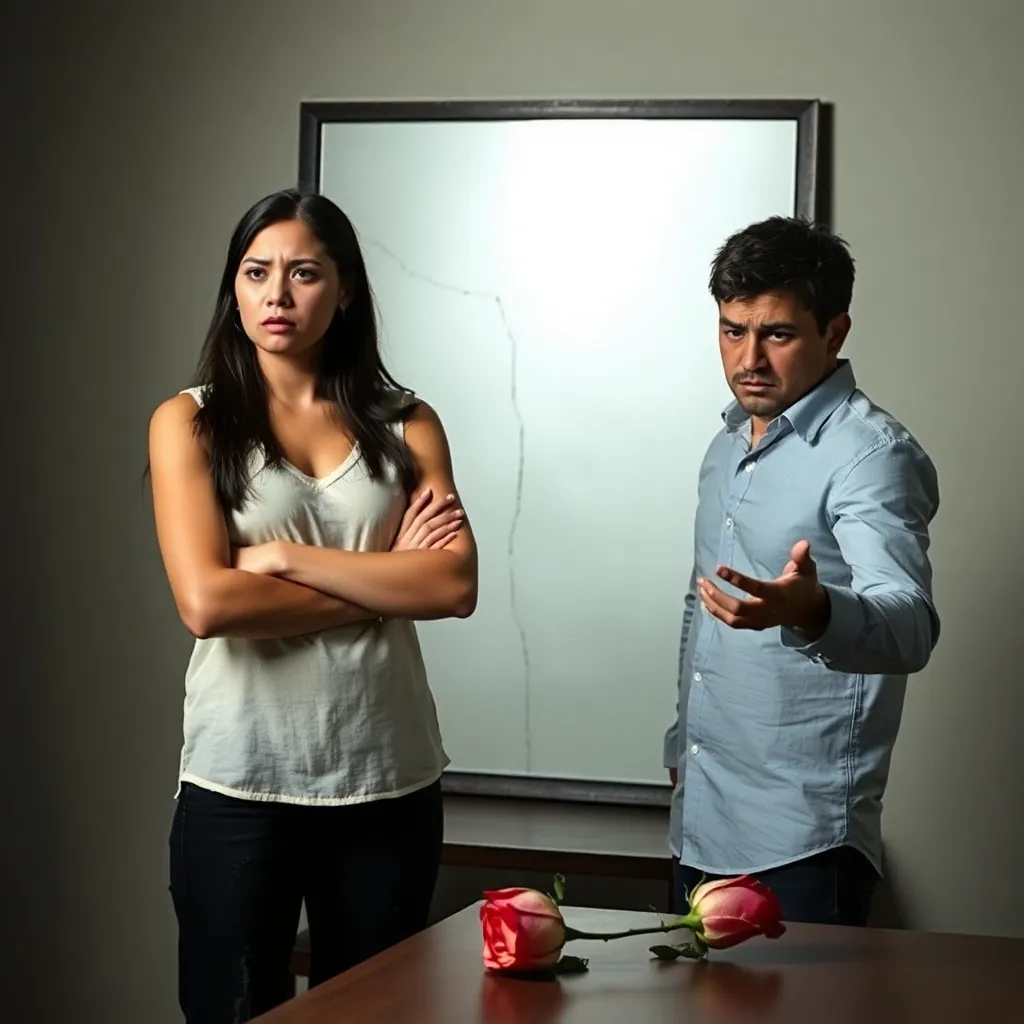Navigating the complexities of relationships can feel like an emotional labyrinth, especially when you’re unsure of how you ended up in the current situation. Perhaps you’ve found yourself tethered to something that feels more draining than fulfilling, and you’re not alone in this journey. Recognizing the subtle signs that keep you emotionally invested in an unhealthy relationship is crucial for your well-being. These signs can often masquerade as love or commitment, making it difficult to see them for what they truly are.
Understanding these signs is the first step towards making empowered choices about your relationship. By identifying these patterns, you can begin to unravel the emotional threads that have kept you hooked. In this article, you’ll discover ten powerful signs that might be anchoring you to a relationship that no longer serves you. Equipped with this knowledge, you can start to craft a path towards healthier, more fulfilling connections.
It’s important to approach this topic with both curiosity and compassion for yourself. The insights you’ll gain here are designed to offer clarity and support, helping you to better understand your emotional landscape. As we explore these signs together, remember that acknowledging the truth is a brave and commendable step on your journey to emotional freedom.
1. Emotional Rollercoaster Thrills You

In the whirlwind of a relationship, the emotional highs and lows can become the very thing that keeps you engaged and enthralled. It’s not uncommon to find yourself swept up in a cycle of intense joy followed by confusion, which can feel like a thrilling ride you’re hesitant to leave.
Such a dynamic often mimics the adrenaline rush of a rollercoaster, making it hard to step away, even when it’s clear that the volatility is more harmful than helpful. Imagine the constant state of anticipation, waiting for the next peak or drop, which can be intoxicating yet draining.
Consider how this pattern might play out in real-world scenarios: one moment, your partner showers you with affection, and the next, they withdraw without explanation. This unpredictability can create a loop where you become more invested in seeking the next high, ignoring the emotional toll it takes.
To break free, it’s crucial to recognize that stability in relationships doesn’t mean a lack of excitement; rather, it fosters a deeper, more sustainable connection.
Understanding this can help you step off the rollercoaster and onto a path of genuine, lasting fulfillment.
2. False Promises Keep You Hopeful

Promises of a brighter future can often keep you tethered to a relationship that may not serve your best interests. When your partner frequently makes **grand promises** but fails to follow through, it creates a cycle of **hope and disappointment** that can be hard to break.
Consider a scenario where someone repeatedly promises to change a behavior that causes conflict, yet the actions never align with their words. This pattern of **unfulfilled promises** can keep you in a state of waiting, hoping that one day things will improve, making it difficult to recognize when it’s time to move on.
Experts suggest that **consistency** between words and actions is crucial for a healthy relationship. If you find that promises are consistently broken, it might be helpful to have an open conversation about your needs and expectations, ensuring both partners are on the same page.
Ultimately, recognizing when hope is based on **realistic potential** and when it’s grounded in false promises can save you from prolonged heartache. Remember, a relationship that truly values your well-being will prioritize **honesty and integrity** over empty words.
3. Intense Chemistry Clouds Judgment

When you’re caught in the whirlwind of a relationship with intense chemistry, it can be exhilarating yet blinding. This overpowering attraction often clouds your judgment, making it difficult to see the relationship’s flaws.
Imagine being so consumed by the excitement of your partner’s presence that you overlook their unreliability or lack of commitment. Such chemistry can lead to a cycle where you keep excusing behavior that would otherwise be unacceptable.
Experts suggest that when chemistry feels overwhelming, it’s crucial to take a step back and assess the relationship from a distance. By doing so, you give yourself the opportunity to see both the positives and negatives more clearly, allowing for a healthier dynamic.
Consider the story of a friend who was swept off her feet by a charming partner, only to find herself repeatedly disappointed by his actions. By recognizing the power chemistry held over her, she was able to recalibrate her expectations and make more mindful choices.
Ultimately, while intense chemistry can be thrilling, it should not be the sole foundation of your relationship. Ensuring that your relationship is built on more than just passion will lead to a more fulfilling and balanced partnership.
4. Inconsistent Attention Feeds Obsession

When someone gives you inconsistent attention, it can feel like trying to catch a butterfly with your bare hands. This unpredictability creates an emotional rollercoaster, making you constantly crave those moments when they do pay attention, often leading to an unhealthy obsession.
Imagine being in a relationship where your partner showers you with affection one moment and then goes silent for days. Such behavior keeps you guessing and yearning for their attention, often making you focus more on their approval than on your own needs.
Experts suggest that this kind of inconsistency is a common tactic in relationships that can lead to emotional dependency. The intermittent reinforcement of attention can make you feel like you’re constantly walking on eggshells, unsure of when you’ll next receive their affection.
To navigate this, prioritize your own emotional stability by setting clear boundaries.
This way, you can prevent falling into the trap of inconsistency and obsession.
5. Unpredictable Affection Excites You

The allure of unpredictable affection lies in its ability to keep you on your toes. With each unexpected gesture, your emotions swing from uncertainty to exhilaration, creating a cycle that is both addictive and confusing.
Consider a scenario where your partner showers you with love one day only to become distant the next. This rollercoaster pattern can hook you into constantly seeking that peak moment of connection, hoping it will return sooner rather than later.
Experts suggest that such behavior can mimic the highs of a gambling addiction, where the unpredictable rewards make the game irresistible. The anticipation of not knowing when the next affectionate moment will occur keeps you engaged, often at the expense of your emotional stability.
To break this cycle, focus on building a foundation of consistent communication and setting healthy boundaries. Discuss with your partner how these unpredictable patterns affect you and collaboratively work towards a more stable and nurturing relationship.
6. Past Memories Blind Your Reality

When you’re caught in the web of a complicated relationship, the allure of past memories often blinds you to current realities. These cherished moments, like a romantic getaway or a shared laugh, can create a false sense of security that makes it difficult to assess your present situation objectively.
Consider how often you find yourself reminiscing about the ‘good old days’ when things felt perfect. Such nostalgia can cloud your judgment, leading you to overlook red flags that might be flashing now.
An example of this is when you recall a time your partner was exceptionally supportive, ignoring their current tendency to be emotionally absent. This selective memory can keep you tethered to a relationship that no longer serves your emotional needs.
To break free from this cycle, it’s crucial to acknowledge the here and now rather than getting lost in what once was. Reflect on both the positive and negative aspects of your relationship with fresh eyes to gain clarity.
Recognizing and accepting the truth of your current relationship status is the first step toward making informed decisions. By doing so, you empower yourself to build a future based on reality rather than illusion, paving the way for healthier connections.
7. Dependency on Their Approval

When you’re caught in a cycle of seeking their approval, it can feel like your entire world hinges on their opinion. This dependency often stems from a desire to maintain harmony in the relationship, but it can ultimately become a trap that blinds you to your own needs and desires.
Consider the scenario of always needing their validation before making decisions. This can lead to a loss of self-confidence, as you may start doubting your own judgment and capabilities.
Experts suggest that this kind of dependency often arises from past experiences where validation was hard to come by. Understanding this can be the first step in breaking the cycle and taking back control over your decisions and self-worth.
It’s crucial to remember that your sense of self-worth shouldn’t be dictated by someone else’s opinions. A healthy relationship thrives when both partners encourage each other’s independence and personal growth.
By building a stronger sense of self, you can enjoy a more balanced and fulfilling partnership. The ultimate goal is to cultivate a relationship where both individuals feel empowered and valued for who they truly are, not just for the approval they seek.
8. Excuses Justify Their Behavior

It’s common to find yourself making excuses to justify their behavior when you’re emotionally invested in a relationship. You might tell yourself they’re just having a bad day or that they’ll change when things settle down. In some cases, you might even take the blame for their actions, believing that your behavior triggered their response. This can lead to a cycle where the responsibility for their actions slowly shifts onto you.
Consider a scenario where a partner constantly cancels plans at the last minute, leaving you feeling disappointed. You might rationalize this by thinking they’re under a lot of work pressure, even if this pattern consistently hurts you. When we justify such behaviors, we inadvertently signal that it’s acceptable, allowing the cycle to persist. This can erode your self-esteem, as you begin to question your worth and accept less than you deserve.
Experts suggest that recognizing and addressing these justifications is crucial for a healthy relationship. Dr. Elaine Rogers, a relationship therapist, emphasizes the importance of setting boundaries and having open conversations about recurring issues. If you find yourself frequently making excuses, it may be time to reassess the relationship dynamics and communicate your feelings assertively.
By addressing these justifications, you open the door to more honest and fulfilling interactions. Acknowledging the impact of their behavior on your well-being can empower you to make decisions that prioritize your emotional health. Remember, a relationship should uplift and support you, not leave you feeling undervalued or uncertain.
9. Drama Fuels Emotional Highs

In many relationships, the presence of constant drama can create a cycle of emotional highs and lows that becomes addictive. These emotional swings might feel like passion or intensity, but they often mask deeper issues that need addressing.
Imagine a scenario where every disagreement escalates into a full-blown argument, only to be followed by an intense reconciliation. This rollercoaster of emotions can create a false sense of closeness, making it hard to distinguish between real intimacy and emotional dependency.
Experts suggest that individuals in such relationships might be seeking the thrill that drama provides, mistaking it for excitement or love. This pattern can be detrimental, leading to exhaustion and confusion about the relationship’s true health.
To break free from this cycle, it’s crucial to recognize the role that constant drama plays in your relationship dynamics. Consider discussing with your partner how to establish more stable and healthy communication patterns that don’t rely on emotional turmoil.
Ultimately, acknowledging the allure of drama and choosing to foster more positive interactions can lead to a more fulfilling relationship. By prioritizing calm and constructive communication, you pave the way for genuine emotional intimacy.
10. Fear of Loneliness Paralyzes You

When you’re gripped by a fear of loneliness, it can feel as if you’re living in a shadow that dims even the brightest moments. This fear often manifests in a reluctance to leave relationships that are no longer serving you, simply because the thought of being alone is paralyzing.
Consider someone who stays in a relationship fraught with tension and unhappiness because they dread coming home to an empty apartment. Their fear tricks them into believing that any relationship, even a toxic one, is better than solitude.
Experts suggest that this fear stems from deep-rooted beliefs about self-worth and social acceptance. When you’re caught in this cycle, it’s crucial to challenge these beliefs and recognize that being alone doesn’t equate to being lonely.
To counteract this fear, start by embracing activities that you enjoy doing alone, such as taking a walk in nature or exploring a new hobby. Engaging in these activities can help you build a sense of independence and confidence outside of your relationship.
Ultimately, acknowledging and addressing your fear of loneliness can empower you to seek the relationships you truly deserve. By finding comfort in your own company, you pave the way for healthier, more fulfilling connections.
Conclusion: Creating Beautiful Outdoor Spaces
In navigating the complexities of relationships, recognizing the ten devastating signs that might be keeping you hooked is crucial. We’ve explored aspects such as emotional manipulation, fear of loneliness, and the cycle of intermittent reinforcement, alongside dependency, the illusion of change, and the pressure of sunk costs. Additionally, the allure of nostalgia, societal expectations, the role of self-worth, and the power of hope keep many entangled in unsatisfying dynamics.
To take immediate action, consider reflecting on these elements in your own relationship. Identify which signs resonate with your experience and open a dialogue with your partner or a trusted confidant. Taking this step can foster clarity and empowerment, setting the stage for healthier relationship choices.
Remember, understanding these signs is the first step towards breaking free and fostering relationships that nourish your well-being. For ongoing support and guidance, save or bookmark this article as a handy reference. Doing so ensures you have a resource to revisit as you continue your journey towards fulfilling connections.
Looking ahead, with awareness and proactive steps, you can cultivate relationships that are not only resilient but also deeply rewarding. Embrace this opportunity for change and let it guide you towards lasting relationship success.
